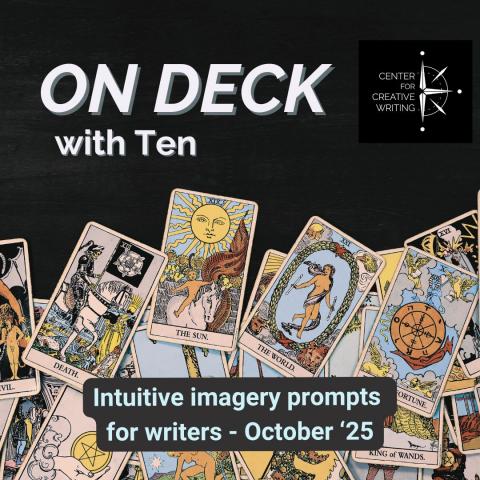
Teneice Durrant, creator of Tarot with Ten, uses various tarot and oracle decks to provide monthly readings for writers, with exercises on using imagery and intuition as prompts. October's prompt is about using the Hermit card to develop a situation where your character seeks knowledge passed on from a mentor figure to help them undermine a larger power in an upcoming conflict.
Using the Hermit to pass on wisdom
Watch and listen to Teneice's tarot reading for writers or read the transcript of the reading below.
Hi everyone, welcome to On Deck. My name is Ten and I am a third-generation tarot reader, a writer, and a mentor with the Center for Creative Writing. We're currently working our way through the major arcana of the tarot and lining up the Fool's Journey of the major arcana with the narrative arc of our main character.
The Hermit
This month's card is the Hermit and a lot of tarot readers will read the Hermit as, you know, becoming a hermit, going inside, going deep, learning about yourself, learning about who you are, hiding yourself in a cave, away from people, you know, just being very hermit-like in your attitudes and your behaviors and things like that. For me, the Hermit is less of a, like, internal story of hiding yourself away and doing deep learning about yourself. The Hermit is more of a Mr. Miyagi character.
I know that I just dated myself, but if you think about the Karate Kid, right, and he would give Daniel all these tasks, you know, like painting or waxing the car or whatever, and it ended up that doing that work, going on that journey of, you know, learning to do all these tasks for Mr. Miyagi actually was teaching him the skills that he needed to know to be successful. So for me, the Hermit is gaining knowledge by climbing the mountain, right? The Hermit is standing at the top of the mountain, he's got this light, it's the same light that's in the star card that we'll see eventually, but he's got this star, it's a lantern, you know, it is like a beacon of light at the top of a mountain. And I liken it a lot to a, like, a lighthouse, right? It's trying to guide you in, it's trying to, you know, help you get to where you need to go.
So the Hermit is going to be somebody who has a great deal of knowledge and wisdom and experience. And for our main character, what that means is, if you kind of follow along with, you know, the Save the Cat Beat structure, which I love and reference often, this is like the, we have to go on a journey, right? We have to go, you know, find something specific, and only one person has it, or only one person can teach us how to do it, right? So it's like Luke Skywalker going to find Yoda so he can be trained, right? That's what this means in the context of our narrative arc, okay? So your main character needs a reason to go to somebody that's more experienced, right? After we have the inciting incident, and the world has changed, the world can never be the same as it was before the inciting incident, right? And, you know, the main character goes back and forth, will I, won't I, what do I need to do? And they've decided that they're gonna go on this journey, and some kind of tool that they need, somebody has it. So they need to go on this journey either by themselves to prove themselves, or, you know, usually there's like a group of friends, the B character, the love interest, whatever.
They end up going on this journey because they have to get to a certain person or a certain place that will give them a thing they need, you know, to solve the problem, okay? So that's what we're looking at here in terms of the hermit.
Your mind is not playing tricks on you. These are smaller cards than last month because it's easier to get more of them in view.
All right, so let's think about what is happening. Let's think about what is it that our main character needs to get from this hermit? What do they need to get? And what do they learn along the way? Okay, goodness. Okay, so we have the Seven of Swords, the Death card, and the Five of Cups.
Seven of Swords
So what do we need the hermit for? Why is our main character going on this adventure? Why are they leaving their home and going out to find this hermit who has something they need? The seven of swords is about, in some instances, conflict, betrayal, sabotage, you know, being sneaky. This guy is, you know, stealing somebody else's swords so that they cannot attack as effectively. The other way you can read this is a strategy that undermines the enemy and saves a lot of people, right? So if there was a big conflict coming up and, you know, your main character does not want this conflict to happen because a lot of people might die.
Some, maybe their home will be caught in the middle of it or, you know, there's some kind of offensive movement that this, you know, big bad villain wants to do. Your main character could be going to the hermit to find another strategy. How can we undermine this, you know, big power, this villain? How can we do it without confronting them face on? Which, you know, is a feature of a lot of narrative arcs where it's like the David and Goliath.
Like, how's our little ragtag group of villagers going to defeat the king who's trying to take us over, right? So they're going to use their smarts, and swords are logic, intellect, thoughts, okay? So they're going to use their intellect, their cunning, you know, their, I don't want to say trickery, but they're going to use their strategic skills to undermine this force that is trying to come in. Now, I mean, this could be, you know, fantasy. This could be, it could be that they need to get some kind of virus computer code so that they can hack into, you know, a CEO's mainframe and show all of their financial records, like whatever it is. This is using your mind, not brute force, okay?
Death
The death card here does not necessarily mean somebody has to die. That might be a good plot point. That might be something that your main character needs to learn to deal with, right? Or maybe because we have the Five of Cups and the Five of Cups is always kind of reflecting back and not looking at what they have, maybe this death occurred because of the inciting incident and their whole motivation here is, you know, I have to, I have to beat this villain no matter what because they killed my brother, right? So it could be part of the plot.
It could be some kind of incentive. It could be something that your main character needs to come to terms with on this journey to find, you know, the Hermit, the master, the, I forgot the word that I used before, but you know, the person who has all that wisdom, right? So your main character has to learn how to deal with this. Death, of course, does not need to be an actual death. It could just be an ending of something. They could be dealing with the ending of the life that they used to know. And with this Five of Cups here, they could be just kind of reflecting back on what had happened instead of moving forward.
Five of Cups
Okay. So let's talk about the Five of Cups real quick because it'll tie it all in together. The Five of Cups is the card of like crying over spilt milk.
It's like this guy's looking at these three cups of wine that are spilled, right? So he's always looking back at the past and like things he thinks he did wrong, right? Like, oh my gosh, I spilled those cups. I'm a terrible person. Everybody thinks I'm terrible because I did these things in the past. You know, I don't want to meet new people or put myself out there or encourage any relationships because look at what I did. I'm such a bad person. Like they're not going to love me. They're not going to believe me. They're not going to want to be my friend because of these cups that I spilled in the past when really, nobody cares. And if they care, they don't blame you.
It's not your fault, you know, that cup spill. It was an accident or, you know, somebody else knocked it over. So you're like, the character here is kind of fixated on mistakes they made in the past, thinking everybody is judging them for them, judging themselves for them, when if he turns around, he still has two full cups of wine and he can move forward.
Like everybody else is kind of hanging out like, hey, come to the party. Here's some wine. Like, here's the cups. Like, you don't need to worry about that old stuff. We have, you know, we have more stuff. We have more milk. We have more wine. You don't have to worry about the wine that was spilled, but he's so stuck on like ruminating on it that he can't forgive himself and he can't get past it. Okay.
A writing prompt
So the writing prompt for this week: your main character needs a piece of information, a tool, a book, a, you know, magic recipe, whatever it is, your main character needs something that's going to help them undermine a larger power. Okay. So they have to go on this journey to find this hermit, whatever it is, do they need to drive across country? Do they need to, um, you know, hike through the enchanted forest? Do they have to sail a boat across crazy waters? Like whatever it is, they need to go on a journey to get to this person, to get this information while they're on this journey, they have to deal with the sense of loss.
Okay. With the Death card, something has ended and it could be a person or it could be a situation and they have to confront that loss. Um, like understanding that it wasn't their fault, understanding that nobody blames them. Okay. So whatever happens, your main character has to think they had something to do with it and they blame themselves, right? There's some kind of self-worth where they feel like they're not good enough to be on this, to be the one tasked with getting this information. Okay.
All right. Thank you guys so much for joining me this week. Just as a reminder, we do have another session of classes coming up starting October 28, and I do teach a tarot and writing class. So if you're interested in that, please send us a message, a DM, reach out to Stacia, the director of the Center for Creative Writing, and we'll get you all the information that you need. Talk to you soon.
What did you think of this tarot reading and the cards as visual prompts for story development? Share with us in the comments, and contact us if you’re interested in working one-on-one with Teneice in part 3 of Writing Toward Balance and Wholeness: Tarot and the Narrative Arc (taking parts 1 and 2 first is not required).
Follow Center Your Writing on Substack to get these posts and more in your inbox.
